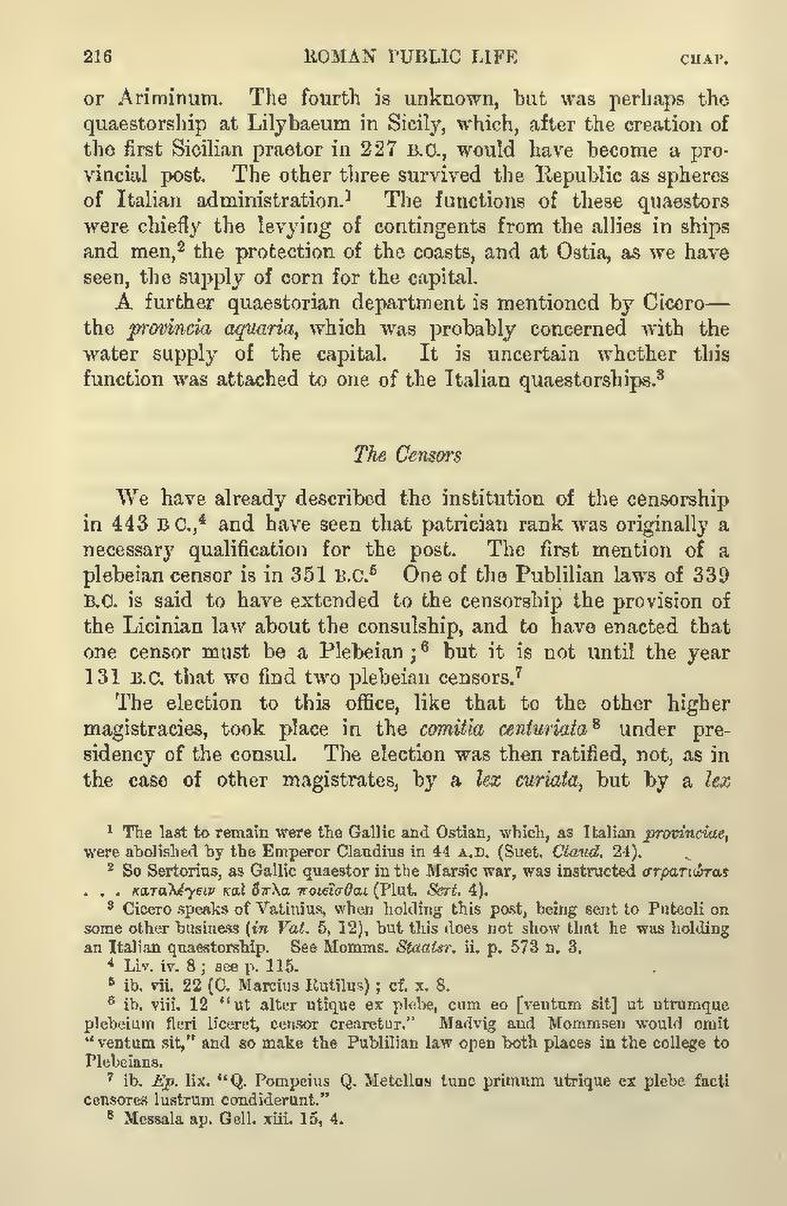or Ariminum. The fourth is unknown, but was perhaps the quaestorship at Lilybaeum in Sicily, which, after the creation of the first Sicilian praetor in 227 B.C., would have become a provincial post. The other three survived the Republic as spheres of Italian administration.[1] The functions of these quaestors were chiefly the levying of contingents from the allies in ships and men,[2] the protection of the coasts, and at Ostia, as we have seen, the supply of corn for the capital.
A further quaestorian department is mentioned by Cicero—the provincia aquaria, which was probably concerned with the water supply of the capital. It is uncertain whether this function was attached to one of the Italian quaestorships.[3] The Censors
We have already described the institution of the censorship in 443 B C.,[4] and have seen that patrician rank was originally a necessary qualification for the post. The first mention of a plebeian censor is in 351 B.C.[5] One of the Publilian laws of 339 B.C. is said to have extended to the censorship the provision of the Licinian law about the consulship, and to have enacted that one censor must be a Plebeian;[6] but it is not until the year 131 B.C. that we find two plebeian censors.[7]
The election to this office, like that to the other higher magistracies, took place in the comitia centuriata[8] under presidency of the consul. The election was then ratified, not, as in the case of other magistrates, by a lex curiata, but by a lex(Plut. Sert. 4).]ut utrumque plebeium fieri liceret, censor crearetur." Madvig and Mommsen would omit "ventum sit," and so make the Publilian law open both places in the college to Plebeians.]
- ↑ The last to remain were the Gallic and Ostian, which, as Italian provinciae, were abolished by the Emperor Claudius in 44 A.D. (Suet. Claud. 24).
- ↑ So Sertorius, as Gallic quaestor in the Marsic war, was instructed [Greek: stratiôtas . . . katalegein kai hopla poieisthai
- ↑ Cicero speaks of Vatinius, when holding this post, being sent to Puteoli on some other business (in Vat. 5, 12), but this does not show that he was holding an Italian quaestorship. See Momms. Staatsr. ii. p. 573 n. 3.
- ↑ Liv. iv. 8; see p. 115.
- ↑ ib. vii. 22 (C. Marcius Rutilus); cf. x. 8.
- ↑ ib. viii. 12 "ut alter utique ex plebe, cum eo [ventum sit
- ↑ ib. Ep. lix. "Q. Pompeius Q. Metellus tune primum utrique ex plebe facti censores lustrum condiderunt."
- ↑ Messala ap. Gell. xiii. 15, 4.
